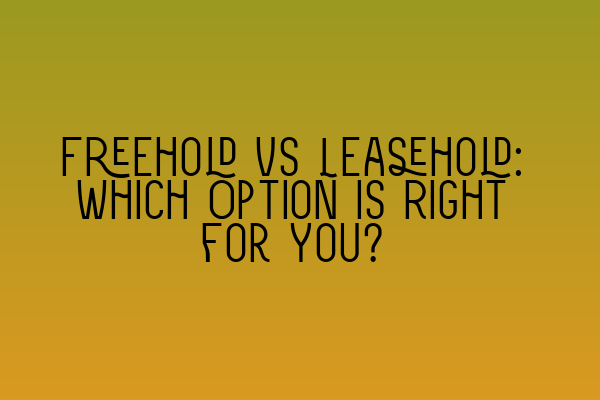Freehold vs Leasehold: Which Option is Right for You?
When it comes to purchasing a property, one of the most important decisions you’ll have to make is whether to opt for a freehold or leasehold arrangement. This decision can have significant implications for your rights and responsibilities as a homeowner. In this article, we will explore the differences between freehold and leasehold properties and help you determine which option is best suited to your needs.
Understanding Freehold Properties
A freehold property is one where you own the land and the building outright. This means that you have complete control and ownership rights over the property, and there is no time limit on your ownership. Freehold properties are typically houses, bungalows, or cottages, where you have sole ownership of the land and the dwelling, including any garden or yard.
Benefits of Freehold Properties:
- Complete ownership and control: With a freehold property, you have the freedom to make any changes or improvements to your property without seeking permission from a landlord.
- No ground rent or service charges: Unlike leasehold properties, freehold properties do not require you to pay ground rent or service charges to a landlord or management company.
- Potential for long-term investment: Freehold properties are often seen as more valuable in the long run, as you have full ownership rights and can benefit from any increase in property value.
However, it’s important to note that as the sole owner, you are also responsible for all maintenance, repairs, and insurance costs associated with the property.
Understanding Leasehold Properties
A leasehold property is one where you own the right to occupy the property for a specified period of time, typically ranging from 99 to 999 years. While you may have exclusive use of the property during the lease term, the ultimate ownership of the land remains with the freeholder.
Benefits of Leasehold Properties:
- Lower upfront costs: Leasehold properties tend to be more affordable upfront compared to freehold properties, making them a popular choice for first-time buyers.
- Shared responsibility: In a leasehold arrangement, the freeholder or management company is responsible for maintaining the common areas and external structure of the building, relieving you of some maintenance and repair obligations.
- Access to amenities: Leasehold properties are often found in developments that offer additional amenities like communal gardens, gyms, and parking facilities.
However, it’s important to consider certain drawbacks of leasehold properties, such as ground rent, service charges, and potential restrictions imposed by the freeholder. Additionally, when the lease term expires, the ownership of the property reverts back to the freeholder.
Which Option is Right for You?
Deciding between freehold and leasehold properties ultimately depends on your individual circumstances, preferences, and long-term goals. Here are a few factors to consider:
- Budget: If you have a limited budget, a leasehold property may be more financially feasible in the short term due to lower upfront costs.
- Control and freedom: If you value complete control over your property and want the freedom to make changes without seeking permission, a freehold property may be more suitable for you.
- Additional amenities: If access to additional amenities is important to you, a leasehold property within a development may be more appealing.
- Long-term investment: If you see the property as a long-term investment and want to have full ownership rights and potential for capital appreciation, a freehold property may be the better option.
In summary, both freehold and leasehold properties have their own set of advantages and considerations. It’s crucial to carefully evaluate your own priorities and consult with a property law expert before making a decision. At SQE Property Law & Land Law, our experienced solicitors can provide you with the guidance and insights you need to make an informed choice.
RELATED ARTICLES:

Freehold vs Leasehold: Which Option is Right for You?
by
Tags: